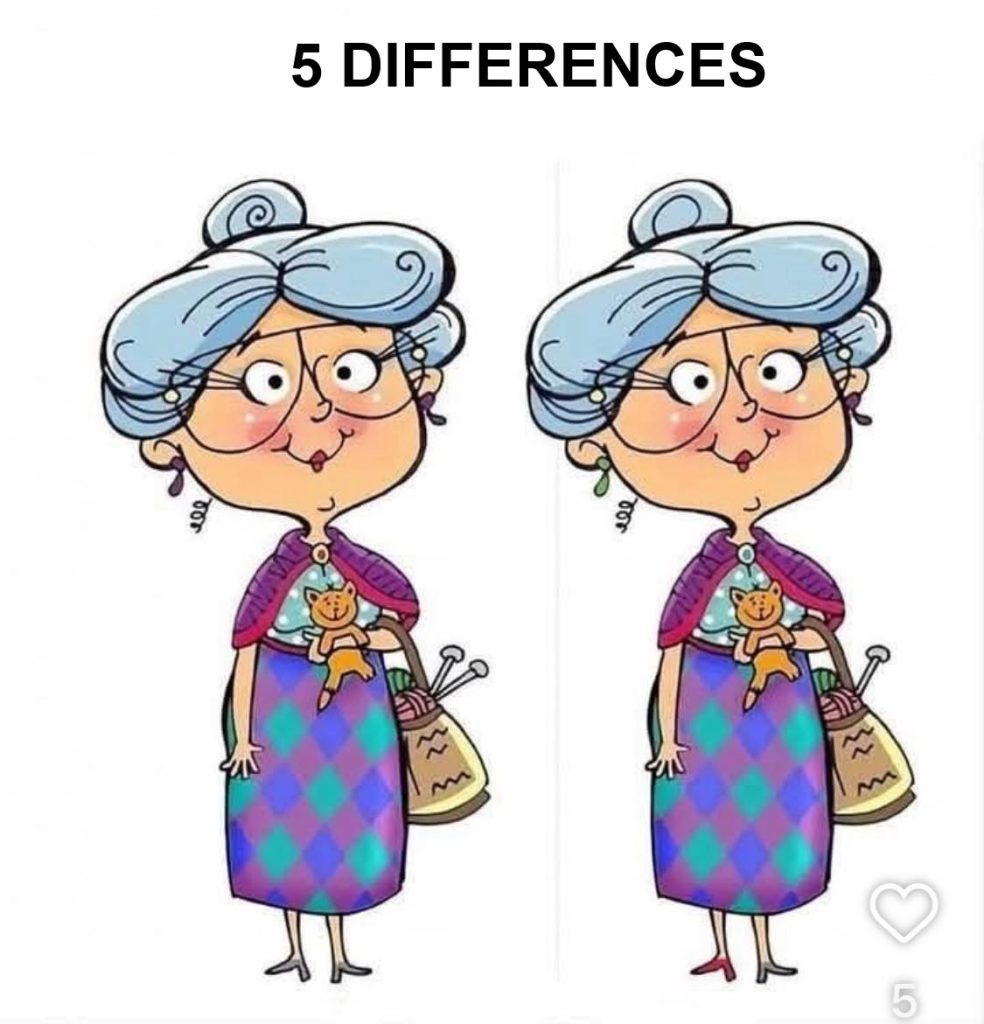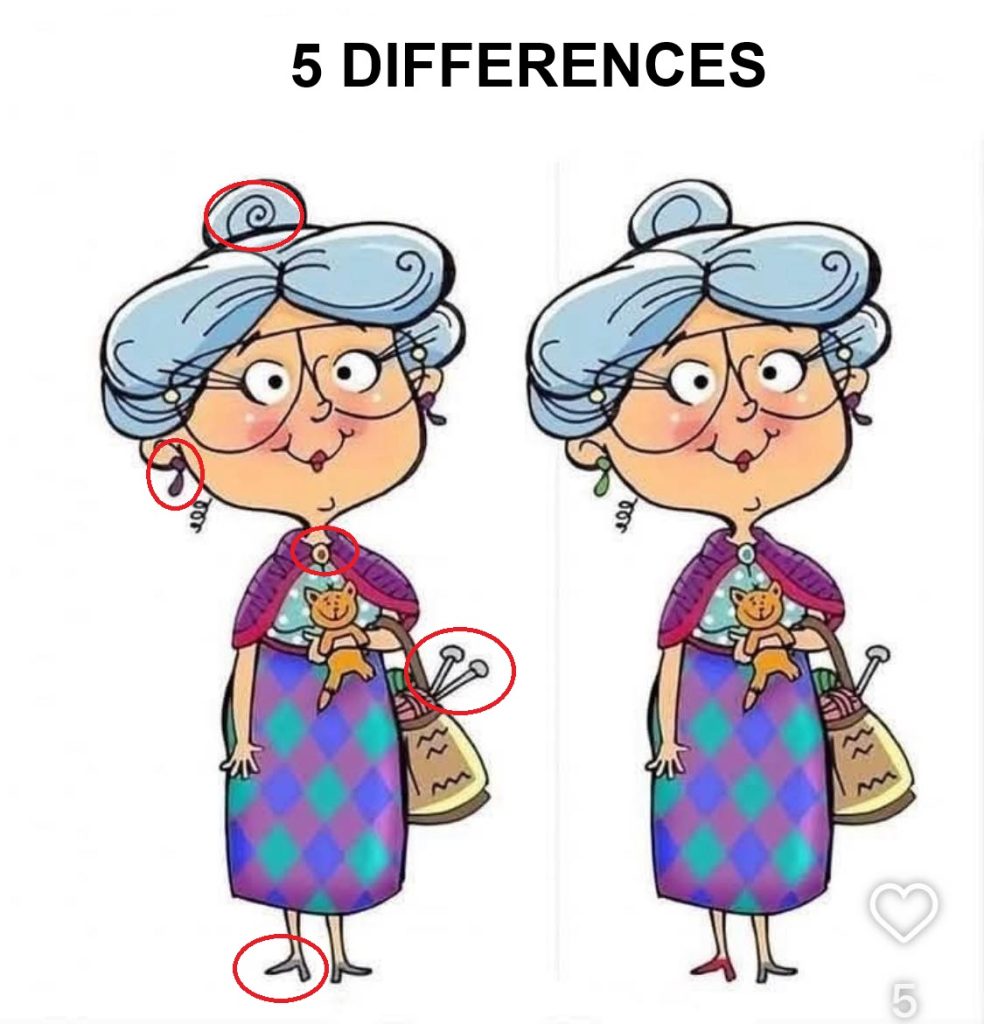Think your eyes are sharper than most? Here’s a puzzle that has frustrated thousands of players. At first glance, these two cheerful grandmothers look exactly the same—same glasses, same dress, same teddy bear. But hidden inside are five sneaky differences that almost everyone misses. In fact, 90% of people give up before spotting them all. The real challenge is: can you be part of the rare 10% who actually succeed?

Why People Fail at This Challenge
Puzzles like this play a clever trick on the brain. We’re naturally wired to focus on the big picture instead of the tiny details. When we see a familiar face, like a smiling grandma, our brain fills in the gaps, assuming everything is identical. That’s why small details escape our notice.
Here’s why most people quit early:
- They get distracted by obvious features like her teddy bear or big glasses.
- They only compare one section of the picture instead of scanning the whole.
- After finding three or four differences, they assume they’re finished.
- Tiny accessories—like earrings or shoes—are often ignored completely.
This is exactly why this puzzle feels so difficult, even though the differences are hiding in plain sight.
Video :Find 5 Differences between two pictures | Spot the Differences | Riddle Hunt
Step-by-Step Guide: Spotting the 5 Differences
Instead of scanning randomly, let’s go through each part of the picture carefully. If you follow along, you’ll notice every change.
1. The Hair Curl
Look closely at her bun. On the left image, there’s a swirl of hair drawn in, almost like a spiral. On the right, it’s missing. That tiny detail is the first difference.
2. The Earrings
Now check her earrings. On the left, she wears a purple teardrop-shaped earring. On the right, it’s just a small green stud. Easy to miss because earrings are so small, but it’s definitely there.
3. The Brooch on Her Chest
See the round brooch holding her cape together? On the left, the brooch is clearly visible. On the right, it’s gone completely. This one hides because the teddy bear steals your attention.
4. The Knitting Needles
Check the basket she’s carrying. In the left image, you see knitting needles poking out of it. In the right, they’re not there at all. Another classic hidden change.
5. The Shoes
Finally, look down at her feet. On the left, her shoes are mismatched—one looks normal, but the other has an extra line sticking out oddly. On the right, both shoes match. This one is tricky because most people don’t pay much attention to feet.

Why These Differences Work So Well
Each difference was chosen to fool the eye:
- Hair curl blends in with natural lines.
- Earrings are tiny and easily overlooked.
- Brooch is near the teddy bear, which steals focus.
- Knitting needles hide because they’re the same color as the basket.
- Shoes get ignored because we don’t usually focus on the bottom of a cartoon.
It’s a perfect recipe for a brain teaser that frustrates but also entertains.
Tips for Solving Spot-the-Difference Puzzles
Want to improve your skills for the next challenge? Try these simple tricks:
- Break the image into sections (top, middle, bottom) and compare piece by piece.
- Focus on accessories and small details rather than just the main subject.
- Look at areas of symmetry—artists often hide differences in matching items like shoes or earrings.
- Don’t stop early! If the puzzle says there are five, keep looking until you’ve found all five.
With practice, your observation skills will improve dramatically.

Final Challenge for You
So—did you find all five before reading the solution? Most players get stuck at three or four. If you managed all five, congratulations—you’re sharper than 90% of players who tried this puzzle.
👉 Comment below how many you spotted on your own.
👉 Share this with your friends and see if they can beat your score.
Conclusion: Sharpen Your Eyes, Train Your Mind
This “grandma puzzle” proves how easily our brains can miss details when distracted by the bigger picture. But by slowing down, scanning carefully, and training your focus, you can spot even the smallest changes. Think of it as a fun workout for your brain—building observation, patience, and logical thinking.
So the next time you see a spot-the-difference game, don’t scroll past. Take the challenge. You might surprise yourself with just how sharp your eyes really are.